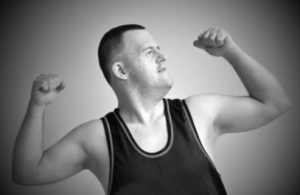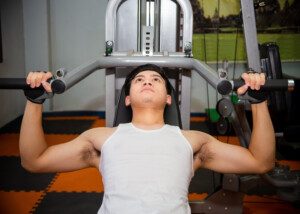People with Down syndrome can work out at a gym, lifting weights and building muscle.
Jake is a man with Down syndrome who loves bodybuilding and weightlifting at a chain health club–pumping iron and feeling as “normal” as all the other muscle guys in the gym.
When I first noticed him he was in his 20s and regularly visited one of the gym chains that I often went to. His father was always there, but they worked out separately.
I will tell you what it was like (in the present tense), observing a young man with Down syndrome lifting weights at a gym.
Jake is proud to go off on his own and lift weights independently, feeling just like any other non-handicapped muscle guy at the gym.
Despite the Down syndrome, Jake is perfectly independent when it comes to loading barbells, loading weight plates on lifting machines, adjusting resistance machines, and doing sets of various weightlifting routines.
Jake can occasionally be seen flexing his muscles before the mirror.
If you hear very loud grunting, it’s probably Jake as he pushes out weights on the chest press machine – macho-sounding, prolonged grunting.
Jake will even show off his biceps to muscle guys who tower over him. He feels just like one of them.
- Jake gets no medals for his gym workouts.
- He doesn’t get to stand on podiums.
- He doesn’t receive hugs.
Yet it’s obvious that lifting weights among “normal,” mainstream people — particularly other men who are tall and muscled — creates in Jake a wealth of self-esteem and self-confidence.
A feeling of equality and inclusion.
At the gym, Jake is participating in the same pursuits that “normal” non-disabled people are participating in.
This man with Down syndrome is equal to the mainstream inside this gym.
Jake’s level of mental retardation is mild; he is high-functioning.
And inside that gym, Jake is just like everyone else. Though he can’t lift as much weight as the big guys, he can out-lift many other people at the gym.
Jake’s middle-aged father is in superb physical condition. This is a guy who looks like he could take out half a dozen young punks in under 30 seconds.
What a wonderful thing that this father of a child with Down syndrome has instilled in that child such an intense passion — and knowledge — of strength training and lifting weights, and has encouraged him to join the mainstream.
Benefits of Weightlifting for Down Syndrome
“A common issue with Down syndrome is weak muscle tone or hypotonia,” says Julie Joffrion, CPT/ACSM, owner at All Inclusive Health, a personal training studio in New Orleans that offers options to those with disabilities.
“However, just because someone with Down syndrome has weak muscle tone, that doesn’t mean they cannot acquire strength in their muscles,” continues Joffrion.
“From childhood and on into adulthood, continued exercise and strength training is beneficial to not just muscular strength, but overall health as well.
“As with any bodybuilding, the goal is to overload the muscle so it becomes stronger over time.
“However, those with physical disabilities, such as Down syndrome, may need to be monitored as they learn how much they can handle.
“The more that the weakened muscle tone is worked and built upon, the stronger the muscles become.
“For someone with Down syndrome, they should also work on developing their balance and coordination to build the muscles in different areas.
“With muscle building and other forms of exercise, individuals with Down syndrome should take caution regarding impact activity on joint stability, especially when there is associated muscle instability and skeletal weakness.”











































